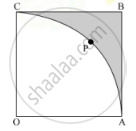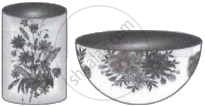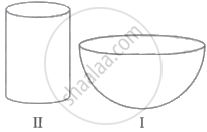Advertisements
Advertisements
प्रश्न
|
Khurja is a city in the Indian state of Uttar Pradesh famous for the pottery. Khurja pottery is traditional Indian pottery work which has attracted Indians as well as foreigners with a variety of tea sets, crockery and ceramic tile works. A huge portion of the ceramics used in the country is supplied by Khurja and is also referred as "The Ceramic Town". One of the private schools of Bulandshahr organised an Educational Tour for class 10 students to Khurja. Students were very excited about the trip. Following are the few pottery objects of Khurja.
Students found the shapes of the objects very interesting and they could easily relate them with mathematical shapes viz sphere, hemisphere, cylinder etc. |
Maths teacher who was accompanying the students asked the following questions:
- The internal radius of hemispherical bowl (filled completely with water) in I is 9 cm and the radius and height of the cylindrical jar in II are 1.5 cm and 4 cm respectively. If the hemispherical bowl is to be emptied in cylindrical jars, then how many cylindrical jars are required?
- If in the cylindrical jar full of water, a conical funnel of the same height and same diameter is immersed, then how much water will flow out of the jar?
उत्तर
a. Given, the radius by the hemispherical bowl, r1 = 9 cm
Radius of the cylindrical jar, r2 = 1.5 cm
Height of cylindrical jar, h2 = 4 cm
Now, Volume of hemispherical bowl = `2/3 πr_1^3`
= `2/3 π(9)^3`
And Volume of cylindrical jar = `πr_2^2h_2`
= π(1.5)2 × 4
Required number of cylindrical jar = `"Volume of hemispherical bowl"/"Volume of cylindrical jar"`
= `(2/3 π(9)^3)/(π(1.5)^2 xx 4)`
= `(2 xx 9 xx 9 xx 9)/(3 xx 1.5 xx 1.5 xx 4)`
= `(3 xx 9 xx 9 xx 10 xx 10)/(15 xx 15 xx 2)`
= `(24,300)/450`
= 54
Hence, 54 cylindrical jars are required.
b. Volume of water flow out of the jar = Volume of the conical funnel
= `1/3 πr_2^2h_2`
= `1/3 xx22/7 xx (1.5)^2 xx 4`
= `1/3 xx 22/7 xx 1.5 xx 1.5 xx 4`
= `(22 xx 15 xx 15 xx 4)/(3 xx 7 xx 10 xx 10)`
= `19800/2100`
= 9.43 cubic cm
Therefore, the water flowing out of the jar is 9.43 cubic cm.
APPEARS IN
संबंधित प्रश्न
A vessel is in the form of a hollow hemisphere mounted by a hollow cylinder. The diameter of the hemisphere is 14 cm and the total height of the vessel is 13 cm. Find the inner surface area of the vessel. [Use `pi = 22/7`]
In Fig. 6, OABC is a square of side 7 cm. If OAPC is a quadrant of a circle with centre O, then find the area of the shaded region. `[\text\ User=22/7]`

The volume of a hemisphere is 2425 `1/2` cm3 . Find its curved surface area.
How many cubes of 10 cm edge can be put in a cubical box of 1 m edge?
Three metallic cubes whose edges are 3 cm, 4 cm and 5 cm, are melted and recast into a single large cube. Find the edge of the new cube formed.
In a right circular cone, the cross-section made by a plane parallel to the base is a
If the areas of three adjacent faces of a cuboid are x, y and z, respectively, the volume of the cuboid is ______.
Match the following columns:
| Column I | Column II |
| (a) The radii of the circular ends of a bucket, in the form of the frustum of a cone of height 30 cm, are 20 cm and 10 cm respectively. The capacity of the bucket is ........cm3. |
(p) 2418π |
| (b) The radii of the circular ends of a conical bucket of height 15 cm are 20 and 12 cm respectively. The slant height of the bucket is ........ cm. |
(q) 22000 |
| (c) The radii of the circular ends of a solid frustum of a cone are 33 cm and 27 cm and its slant height is 10 cm. The total surface area of the bucket is .........cm2. |
(r) 12 |
| (d) Three solid metallic spheres of radii 3 cm, 4 cm and 5 cm are melted to form a single solid sphere. The diameter of the resulting sphere is ........ cm. |
(s) 17 |
A plumbline (sahul) is the combination of (see figure) ______.
Statement A (Assertion): Total Surface area of the top is the sum of the curved surface area of the hemisphere and the curved surface area of the cone.
Statement R( Reason): Top is obtained by joining the plane surfaces of the hemisphere and cone together.



